Security
The CCNP Security core exam is the Implementing and Operating Cisco Security Core Technologies (SCOR) exam (350-701). The exam covers a wide range of topics related to security technologies, including network security, cloud security, content security, endpoint protection and detection, and secure network access.
The CCNP Security certification requires passing two exams, a core exam, and a concentration exam. The concentration exams are designed to allow candidates to specialize in specific areas of security networking. There are currently six concentration exams available:
1.Implementing and Operating Cisco Security Core Technologies (350-701)
2.Implementing and Configuring Cisco Identity Services Engine (300-715)
3.Securing Email with Cisco Email Security Appliance (300-720)
4.Securing the Web with Cisco Web Security Appliance (300-725)
5.Implementing Secure Solutions with Virtual Private Networks(300-730)
6.Implementing Automation for Cisco Security Solutions (300-735)
7.Candidates must pass one concentration exam to earn the CCNP Security certification. The concentration exams cover 8.specific topics related to identity services, email security, web security, VPNs, and automation.
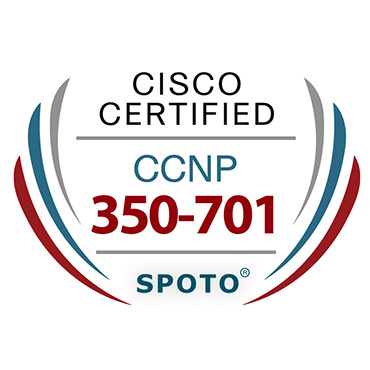
【2023 Latest】350-701 SCOR: Cisco Certified Network Professional (CCNP) Security Exam Preparation
The 350-701 SCOR (Implementing and Operating Cisco Security Core Technologies) exam is a certification exam offered by Cisco to validate the knowledge and skills of security professionals in implementing and operating core security technologies. Passing the 350-701 SCOR exam is one of the requirements for earning the Cisco Certified Specialist - Security Core certification, which is a prerequisite for several other Cisco security certifications, including the Cisco Certified Network Professional (CCNP) Security and the Cisco Certified Internetwork Expert (CCIE) Security certifications. The exam covers a range of security topics, including Network security, Cloud security, Content security, Endpoint protection and detection, Secure network access, and Visibility and enforcement. Some of the common topics covered under the 350-701 SCOR exam include: Security Concepts: This topic covers fundamental security concepts and best practices, such as threat actors and their motivations, security policies and procedures, and security controls. It also includes an overview of cryptography and public key infrastructure (PKI). Network Security: This topic covers network security technologies such as firewalls, intrusion prevention systems (IPS), virtual private networks (VPNs), network access control (NAC), and network segmentation. It also includes secure network design principles. Securing the Cloud: This topic covers cloud computing models and architectures, as well as the security considerations and controls for cloud-based infrastructure, platforms, and applications. It also includes an overview of cloud security solutions such as cloud access security brokers (CASBs). Content Security: This topic covers securing web and email traffic using technologies such as secure web gateways (SWGs) and email security appliances. It also includes an overview of advanced malware protection (AMP) and next-generation firewalls (NGFWs). Endpoint Protection and Detection: This topic covers endpoint security technologies such as host-based intrusion prevention systems (HIPS), endpoint detection and response (EDR), and network access control (NAC). It also includes an overview of mobile device management (MDM) and mobile threat defense (MTD) solutions. Secure Network Access, Visibility, and Enforcement: This topic covers authentication, authorization, and accounting (AAA) technologies, as well as secure access service edge (SASE) solutions. It also includes an overview of network visibility and analytics solutions for monitoring and detecting security threats. Overall, the 350-701 SCOR exam is designed to test a candidate's comprehensive knowledge and understanding of core security technologies and their ability to implement and operate them effectively in a variety of scenarios. 350-701 SCOR Exam Overview Exam Code: 350-701 SCOR Exam Name: Implementing and Operating Cisco Security Core Technologies Exam Duration: 120 minutes Exam Format: Multiple-choice, Drag-and-Drop, Simulation Number of Questions: 90-110 questions Exam Cost: $400 USD Exam Language: English SPOTO Guarantee 100% Pass Rate SPOTO provides the best exam dump, which covers real exam-like questions. The exam dump includes practice questions that closely resemble the actual exam questions in terms of format and difficulty level. So we proudly guarantee you a 100% pass.
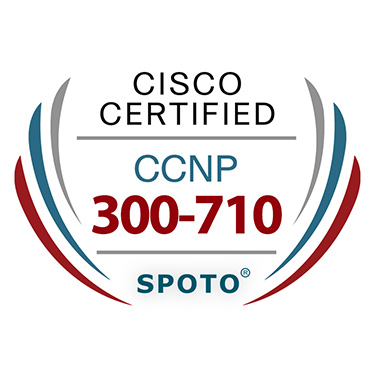
【2023 Latest】300-710 SNCF: Cisco Certified Network Professional (CCNP) Security Exam Preparation
The 300-710 SNCF (Securing Networks with Cisco Firepower) exam is a certification exam offered by Cisco that tests a candidate's knowledge of Cisco Firepower® Threat Defense and Firepower®, including policy configurations, integrations, deployments, management and troubleshooting. The exam covers a range of topics related to network security, including the deployment, configuration, management, and troubleshooting of Cisco Firepower Threat Defense (FTD) systems, Next-Generation Firewalls (NGFWs), and Firepower services in different network architectures and environments. The 300-710 SNCF exam is designed for network security engineers, network administrators, and cybersecurity professionals who work with Cisco Firepower technologies and want to validate their skills and knowledge. Some of the common topics covered under the 300-710 SNCF exam include: 1.0 Deployments: This topic covers the deployment of Cisco Firepower Threat Defense (FTD) systems and Next-Generation Firewalls (NGFWs) in different network architectures, such as single site, multi-site, and hybrid environments. It also covers the deployment of Firepower services in virtual and cloud environments. 2.0 Configurations: This topic covers the configuration of FTD and NGFW systems, including access control policies, network objects, security zones, user identity and application control, SSL decryption, and advanced malware protection. It also covers the configuration of Firepower services in virtual and cloud environments. 3.0 Management and Troubleshooting: This topic covers the management of FTD and NGFW systems using the Firepower Management Center (FMC) and the command-line interface (CLI). It includes topics such as device registration, policy management, system updates, event correlation, and troubleshooting common issues. 4.0 Integrations: This topic covers the integration of FTD and NGFW systems with other network security technologies, such as intrusion prevention systems (IPS), web security appliances (WSA), and network access control (NAC) solutions. It also covers the integration of Firepower services with virtual and cloud environments. 300-710 SNCF Exam Overview Exam Code: 300-710 SNCF Exam Name: Securing Networks with Cisco Firepower Exam Duration: 90 minutes Exam Format: Multiple-choice, Drag-and-Drop, Simulation Number of Questions: 61 questions Exam Cost: $300 USD Exam Language: English SPOTO Guarantee 100% Pass Rate SPOTO provides the best exam dump, which covers real exam-like questions. The exam dump includes practice questions that closely resemble the actual exam questions in terms of format and difficulty level. So we proudly guarantee you a 100% pass.
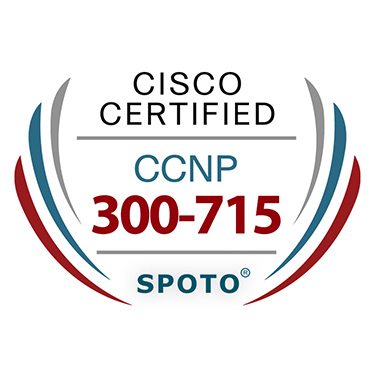
【2023 Latest】300-715 SISE: Cisco Certified Network Professional (CCNP) Security Exam Preparation
The 300-715 SISE (Implementing and Configuring Cisco Identity Services Engine) exam is a certification exam offered by Cisco that focuses on testing the knowledge and skills of network security engineers, network administrators, and cybersecurity professionals in implementing and configuring Cisco Identity Services Engine (ISE) for network security and identity management. The exam covers topics such as architecture and deployment, policy enforcement, web authentication and guest services, endpoint compliance, and network access device administration. Some of the common topics covered under the 300-715 SISE exam include: 1.0 Architecture and Deployment: This topic covers the architecture and deployment of Cisco Identity Services Engine (ISE) in different network environments, including on-premises and cloud-based deployments. It includes topics such as ISE components, deployment options, high availability, and sizing guidelines. 2.0 Policy Enforcement: This topic covers the configuration and enforcement of network access policies using Cisco ISE. It includes topics such as authentication and authorization policies, endpoint compliance, posture assessment, and device profiling. Candidates should have an understanding of policy rules, authorization profiles, policy sets, and network access profiles. 3.0 Web Auth and Guest Services: This topic covers the configuration and management of web authentication and guest access using Cisco ISE. It includes topics such as sponsor portal, self-registration portal, and guest lifecycle management. Candidates should be familiar with the different types of web authentication and guest access options available in Cisco ISE. 4.0 Profiler: This topic covers the configuration and use of Cisco ISE's endpoint profiler service. It includes topics such as endpoint identification, endpoint profiling, and endpoint posture assessment. Candidates should be able to configure endpoint profiling policies and understand how to use endpoint profiling data for policy enforcement. 5.0 BYOD: This topic covers the configuration and management of Bring Your Own Device (BYOD) policies in Cisco ISE. It includes topics such as device onboarding, device provisioning, and device posture assessment. Candidates should have an understanding of the different components of a BYOD solution and how to configure them in Cisco ISE. 6.0 Endpoint Compliance: This topic covers the configuration and enforcement of endpoint compliance policies in Cisco ISE. It includes topics such as endpoint security, antivirus protection, and operating system patching. Candidates should be familiar with the different types of endpoint compliance policies available in Cisco ISE and how to configure them. 7.0 Network Access Device Administration: This topic covers the configuration and management of network access devices (NADs) in Cisco ISE. It includes topics such as NAD configuration, device profiling, and network device groups. Candidates should be able to configure NADs in Cisco ISE and understand how to use device profiling data for policy enforcement. 300-715 SISE Exam Overview Exam Code: 300-715 SISE Exam Name: Implementing and Configuring Cisco Identity Services Engine Exam Duration: 90 minutes Exam Format: Multiple-choice, Drag-and-Drop, Simulation Number of Questions: 61 questions Exam Cost: $300 USD Exam Language: English SPOTO Guarantee 100% Pass Rate SPOTO provides the best exam dump, which covers real exam-like questions. The exam dump includes practice questions that closely resemble the actual exam questions in terms of format and difficulty level. So we proudly guarantee you a 100% pass.
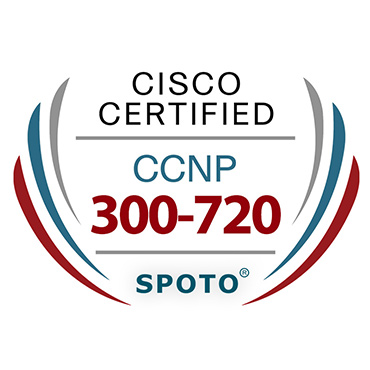
【2023 Latest】300-720 SESA: Cisco Certified Network Professional (CCNP) Security Exam Preparation
The 300-720 SESA (Securing Email with Cisco Email Security Appliance) exam is a certification exam offered by Cisco to validate the knowledge and skills of IT professionals in administering and supporting Cisco Email Security Appliance. The exam covers topics such as configuring and managing Cisco ESA, controlling spam, configuring message and content filters, using LDAP and SMTP sessions, configuring email authentication and encryption, and managing system quarantines and delivery methods. Some of the common topics covered under the 300-720 SESA exam include: 1.0 Cisco Email Security Appliance Administration: This topic covers the configuration and management of Cisco Email Security Appliance (ESA), including its architecture, GUI, CLI, and system setup. It also covers the deployment of email security solutions, including virtualization and clustering. 2.0 Spam Control with Talos SenderBase and Antispam: This topic covers the techniques used to control spam, including SenderBase Reputation Scores, SenderBase Network Participation, and SenderBase SenderScore. It also covers the various antispam techniques used by Cisco ESA, including blacklisting, graylisting, and content-based filtering. 3.0 Content and Message filters: This topic covers the configuration of message filters, including those for keywords, regular expressions, and attachments. It also covers the use of content filters, including those for data loss prevention, virus scanning, and file analysis. 4.0 LDAP and SMTP Sessions: This topic covers the use of LDAP (Lightweight Directory Access Protocol) for user authentication and authorization. It also covers the use of SMTP (Simple Mail Transfer Protocol) sessions for email delivery, including message routing, content inspection, and encryption. 5.0 Email Authentication and Encryption: This topic covers the configuration of email authentication protocols, including SPF (Sender Policy Framework), DKIM (DomainKeys Identified Mail), and DMARC (Domain-based Message Authentication, Reporting, and Conformance). It also covers the configuration of email encryption, including TLS (Transport Layer Security) and S/MIME (Secure/Multipurpose Internet Mail Extensions). 6.0 System Quarantines and Delivery Methods: This topic covers the use of quarantines to prevent malicious emails from reaching users' inboxes. It also covers the configuration of delivery methods for emails, including SMTP, LDAP, and virtual routing and forwarding (VRF). 300-720 SESA Exam Overview Exam Code: 300-720 SESA Exam Name: Securing Email with Cisco Email Security Appliance Exam Duration: 90 minutes Exam Format: Multiple-choice, Drag-and-Drop, Simulation Number of Questions: 61 questions Exam Cost: $300 USD Exam Language: English SPOTO Guarantee 100% Pass Rate SPOTO provides the best exam dump, which covers real exam-like questions. The exam dump includes practice questions that closely resemble the actual exam questions in terms of format and difficulty level. So we proudly guarantee you a 100% pass.
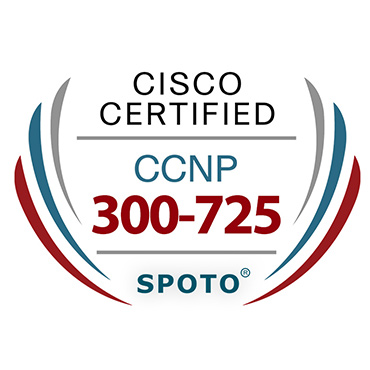
【2023 Latest】300-725 SWSA: Cisco Certified Network Professional (CCNP) Security Exam Preparation
The 300-725 SWSA (Securing the Web with Cisco Web Security Appliance) exam is a certification exam offered by Cisco. This exam tests a candidate's knowledge of Cisco Web Security Appliance, including proxy services, authentication, decryption policies differentiated traffic access policies and identification policies, acceptable use control settings, malware defense, and data security and data loss prevention. Candidates who pass the exam demonstrate their ability to implement, configure, and manage Cisco web security solutions to protect their organization from web-based threats. Some of the common topics covered under the 300-725 SWSA exam include: 1.0 Cisco WSA Features: This topic covers the features and capabilities of the Cisco Web Security Appliance, including its architecture, deployment models, and licensing. 2.0 Configuration: This topic covers the initial setup and configuration of the WSA, including network settings, system administration, and license activation. 3.0 Proxy Services: This topic covers the configuration and administration of the proxy services on the WSA, including HTTP, HTTPS, FTP, and SOCKS. 4.0 Authentication: This topic covers the configuration and administration of authentication mechanisms on the WSA, including LDAP, NTLM, and Kerberos. 5.0 Decryption Policies to Control HTTPS Traffic: This topic covers the configuration and administration of the decryption policies on the WSA to control HTTPS traffic. 6.0 Differentiated Traffic Access Policies and Identification Profiles: This topic covers the configuration and administration of the differentiated traffic access policies (DTAP) and identification profiles (IDP) on the WSA. 7.0 Acceptable Use Control: This topic covers the configuration and administration of acceptable use controls (AUC) on the WSA, including URL filtering, content filtering, and time-of-day restrictions. 8.0 Malware Defense: This topic covers the configuration and administration of the malware defense features on the WSA, including antivirus scanning, AMP, and file reputation filtering. 9.0 Reporting and Tracking Web Transactions: This topic covers the configuration and administration of the reporting and tracking features on the WSA, including log files, dashboards, and alerts. 300-725 SWSA Exam Overview Exam Code: 300-725 SWSA Exam Name: Securing the Web with Cisco Web Security Appliance Exam Duration: 90 minutes Exam Format: Multiple-choice, Drag-and-Drop, Simulation Number of Questions: 61 questions Exam Cost: $300 USD Exam Language: English and Japanese SPOTO Guarantee 100% Pass Rate SPOTO provides the best exam dump, which covers real exam-like questions. The exam dump includes practice questions that closely resemble the actual exam questions in terms of format and difficulty level. So we proudly guarantee you a 100% pass.
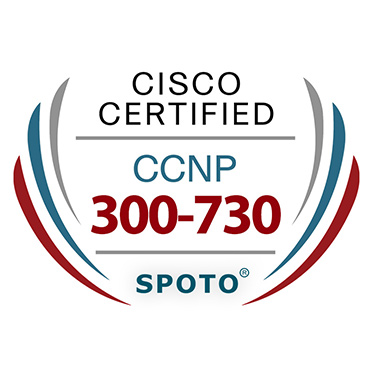
【2023 Latest】300-730 SVPN: Cisco Certified Network Professional (CCNP) Security Exam Preparation
The SVPN 300-730 (Implementing Secure Solutions with Virtual Private Networks) exam offered by Cisco validates the knowledge and skills of network security engineers in implementing and managing VPN solutions. The exam focuses on site-to-site VPNs on routers and firewalls, remote access VPNs, troubleshooting VPNs using ASDM and CLI, and secure communication architectures. Some of the common topics covered under the 300-730 SVPN exam include: 1.0 Site-to-site Virtual Private Networks on Routers and Firewalls: This topic covers the design, implementation, and configuration of site-to-site VPNs on both routers and firewalls. Candidates are expected to have a solid understanding of various VPN protocols, such as IPsec and SSL, and how to configure them on different network devices. 2.0 Remote access VPNs: This topic covers the implementation and configuration of remote access VPNs. Candidates should have knowledge of various remote access VPN protocols, such as SSL VPN and IPsec VPN, and how to configure them on different devices. In addition, candidates should be familiar with configuring VPN client software and troubleshooting common issues related to remote access VPNs. 3.0 Troubleshooting using ASDM and CLI: This topic covers how to use both the ASDM (Adaptive Security Device Manager) and CLI (Command Line Interface) to troubleshoot VPN-related issues. Candidates should be familiar with troubleshooting connectivity issues, security issues, and other common problems related to VPNs. 4.0 Secure Communications Architectures: This topic covers the design and implementation of secure communication architectures. Candidates should be familiar with designing and implementing VPNs for secure communication between different sites, including using firewalls and other security devices to create secure communication channels. They should also have knowledge of secure communication protocols, such as SSL/TLS and IPSec, and how to implement them in different scenarios. SVPN 300-730 Exam Overview Exam Code: SVPN 300-730 Exam Name: Implementing Secure Solutions with Virtual Private Networks Exam Duration: 90 minutes Exam Format: Multiple-choice, Drag-and-Drop, Simulation Number of Questions: 61 questions Exam Cost: $300 USD Exam Language: English and Japanese SPOTO Guarantee 100% Pass Rate SPOTO provides the best exam dump, which covers real exam-like questions. The exam dump includes practice questions that closely resemble the actual exam questions in terms of format and difficulty level. So we proudly guarantee you a 100% pass.
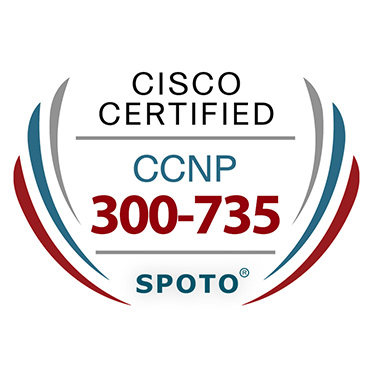
【2023 Latest】300-735 SAUTO: Cisco Certified Network Professional (CCNP) Security Exam Preparation
The 300-735 SAUTO (Automating and Programming Cisco Security Solutions) exam is a certification exam offered by Cisco. This exam tests the candidate's knowledge and skills in automating and programming security solutions using Cisco technologies. The exam covers topics such as network programmability foundations, network security, advanced threat and endpoint security, and cloud, web, and email security. Some of the common topics covered under the 300-735 SAUTO exam include: 1.0 Network Programmability Foundation: This topic covers the basics of network automation and programmability. It includes knowledge of various tools and protocols used in network automation such as Python, REST API, YANG data models, NETCONF, and more. 2.0 Network Security: This topic covers network security principles and techniques, including secure design, risk management, access control, threat detection, and mitigation. It also includes knowledge of network security products such as firewalls, VPNs, and intrusion prevention systems (IPS). 3.0 Advanced Threat & Endpoint Security: This topic covers advanced threat and endpoint security techniques, including threat intelligence, threat hunting, endpoint detection and response (EDR), and sandboxing. It also includes knowledge of security products such as Cisco Umbrella, AMP, and Stealthwatch. 4.0 Cloud, Web, and Email Security: This topic covers cloud security, web security, and email security. It includes knowledge of cloud security principles, technologies, and services such as cloud access security brokers (CASBs), virtual private clouds (VPCs), and Software as a Service (SaaS) security. It also covers web and email security, including techniques such as web application firewalls (WAFs), anti-spam, anti-virus, and anti-phishing measures. The 300-735 SAUTO Exam Overview Exam Code: 300-735 SAUTO Exam Name: Automating and Programming Cisco Security Solutions Exam Duration: 90 minutes Exam Format: Multiple-choice, Drag-and-Drop, Simulation Number of Questions: 61 questions Exam Cost: $300 USD Exam Language: English and Japanese SPOTO Guarantee 100% Pass Rate SPOTO provides the best exam dump, which covers real exam-like questions. The exam dump includes practice questions that closely resemble the actual exam questions in terms of format and difficulty level. So we proudly guarantee you a 100% pass.